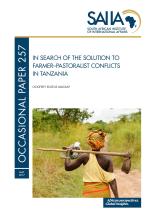/ library resources
Showing items 1 through 9 of 396.En América Latina, el 40% de las mujeres rurales mayores de 15 años trabaja de forma no remunerada. De ellas, el 82% vive en hogares con ingresos que provienen en su totalidad de actividades agropecuarias realizadas de manera conjunta por todos los miembros de la familia.
Sulá Batsú y Land Portal llevaron a cabo, a través de Anacaonas.net y LandPortal.info, el debate en línea Género y Tierra, el cual constituyó un espacio para reflexionar acerca del derecho, la tenencia y el uso de la tierra; profundizando en el análisis crítico sobre si el derecho a la tierra as
Land-use conflict is not a new phenomenon for pastoralists and farmers in Tanzania with murders, the killing of livestock and the loss of property as a consequence of this conflict featuring in the news for many years n
Tanzania Natural Resource Forum in partnership with Care international implements a five years pastoralist programme (2012-2016) through registered Tanzanian Civil society Organizations (CSOs) and/or Community Based Organizations (CBOs) that work to improve the capacity of communities to overcome
In the year 2014, the PP has recorded great achievements in terms of revised outcomes. Some unique and strategic approaches employed by the PP are partly the reason for the achievements.
El control de activos condiciona la posibilidad de que las familias puedan lograr un desarrollo adecuado de sus capacidades, superar la situación de pobreza y dinamizar sus territorios; esta condición es particularmente válida considerando la situación de las mujeres.
La mayor parte de los países de la región latinoamericana reconocen y garantizan en sus Constituciones el derecho a la tierra para las poblaciones que dependen de ella, pues este recurso es indispensable para su subsistencia, seguridad e identidad.
This research, entitled "The Impact of Gendered Legal Rights to Land on the Prevalence and Nature of Intra- and Inter-Household Disputes" set out to interrogate the changing landscape of gendered land rights in Rwanda, and to examine the impact of the statutory changes introduced by laws governin
Before 1999, land rights in Rwanda were governed by three regimes: customary
(traditional) law, colonial laws still in effect, and laws enacted after independence. In each of
these, men were privileged in ownership and control of land whereas women were excluded
Pagination
Land Library Search
Through our robust search engine, you can search for any item of the over 73,000 highly curated resources in the Land Library.
If you would like to find an overview of what is possible, feel free to peruse the Search Guide.









